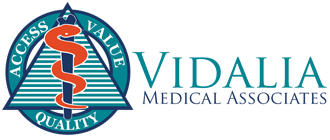-
Q: How do I know if I am at risk for vascular disease??
- A: If you smoke, have hypertension, diabetes, elevated cholesterol/triglycerides, or elevated C-reactive protein you are at risk. Also if you live a sedentary lifestyle (inactive – couch potato) or a high stress lifestyle you are at risk. A family history of cardiovascular disease (stroke, heart attack, peripheral arterial disease, aneurysm) increases your risk of vascular disease as well.
-
Q: Who should have screening vascular testing?
- A: If you are at increased risk and are asymptomatic (experiencing no symptoms of vascular disease), you are a candidate to undergo carotid artery, aortic aneurysm and peripheral vascular disease screening. These screenings are a free service at Vidalia Medical Associates.
-
Q: How can I get the free screening exams done?
- A:Call 538-TEST (8378) and speak to our Triage Nurse for an appointment.
-
Q: Why is it important to have my carotid arteries checked if the doctor doesn’t hear an abnormality when he listens to my neck?
- A: Early detection of carotid artery disease can predict your 10 year risk for a stroke or cardiac event. Even mild carotid artery wall thickening puts you at risk. By the time you hear a “bruit” (sound the doctor may detect when he listens to your neck); advanced carotid artery disease is likely to be present. The following table shows your 10 year risk for a cardiac / stroke event based on the degree of carotid artery disease present.
-
Q: What is an aneurysm?
- A: An aneurysm is a stretching, dilatation and bulging of an artery that occurs as a result of weakening of the arterial wall and loss of its usual elastic properties. Aneurysms can occur in any artery in the body, but are most common in the aorta – the main central artery of the body which supplies blood flow to the body’s organs.
-
Q: If a member of my family has had an aneurysm, am I at increased risk for developing one?
- A: If a member of your immediate family (parent, grandparent, sibling) has had an aneurysm, then you are at increased risk for developing one yourself.
-
Q: I have pain in my legs when I walk, but it gets better if I stop and rest for a period of time. Do I have peripheral arterial disease (poor circulation in the legs)?
- A: Your symptoms are a classic sign of peripheral arterial disease. Exertional limb pain relieved by rest can certainly be a warning sign that vascular disease is present. You should discuss your symptoms with your healthcare provider as simple noninvasive testing (segmental limb pressure testing) is available for detecting the presence of peripheral arterial disease..
Links:
American Stroke Association
American Heart Association
American Diabetes Association
